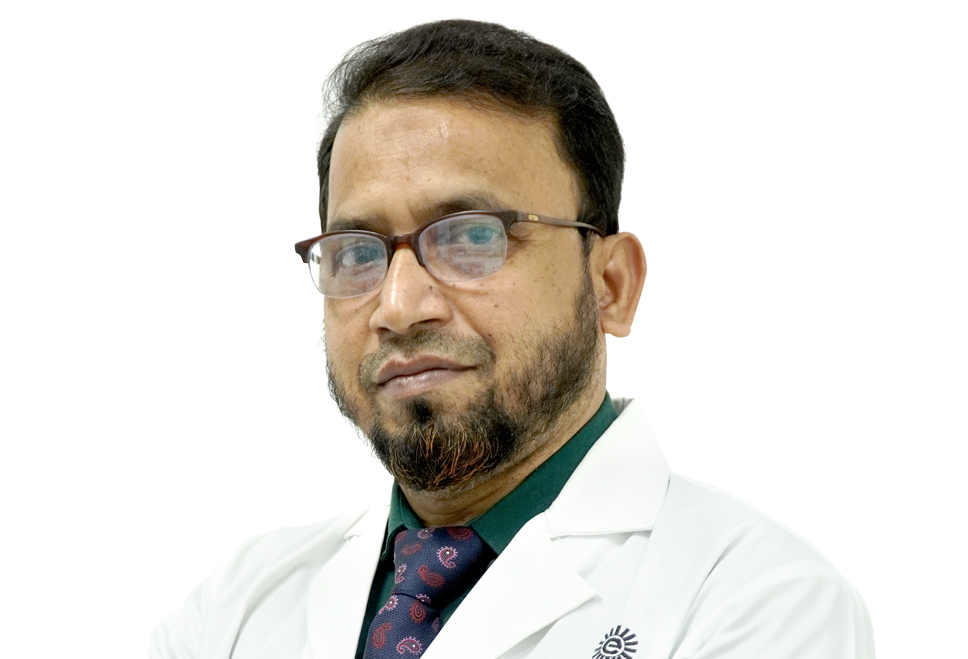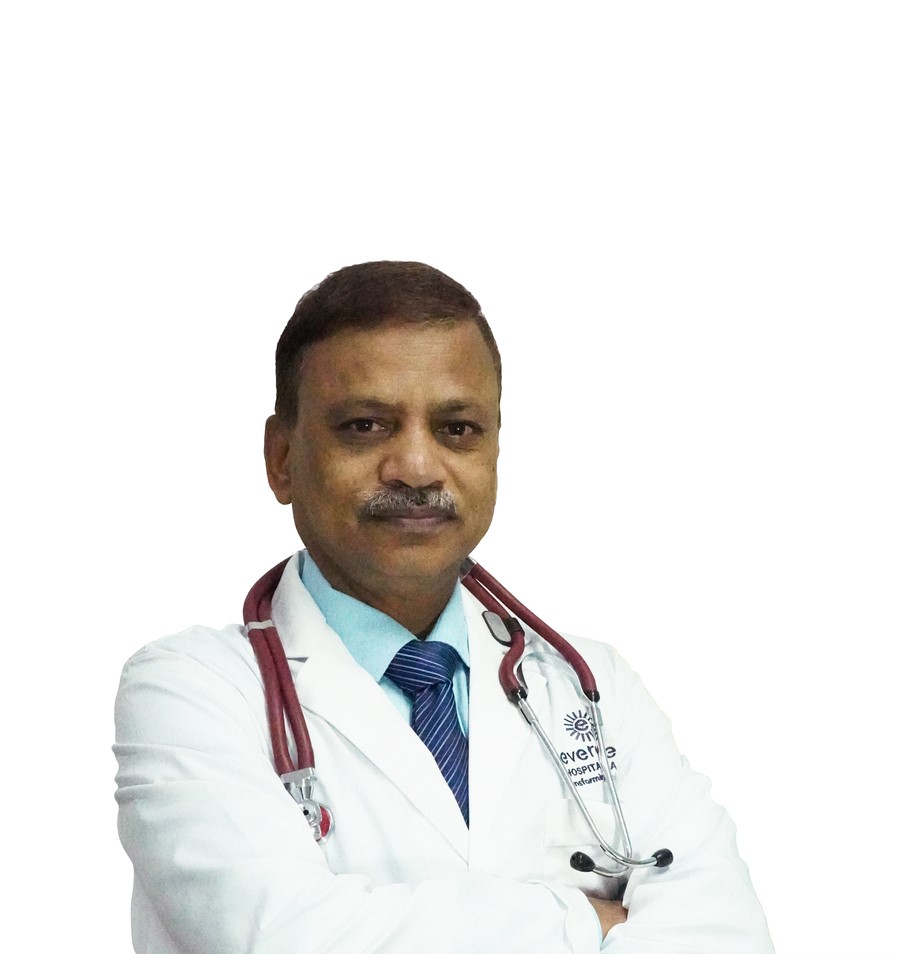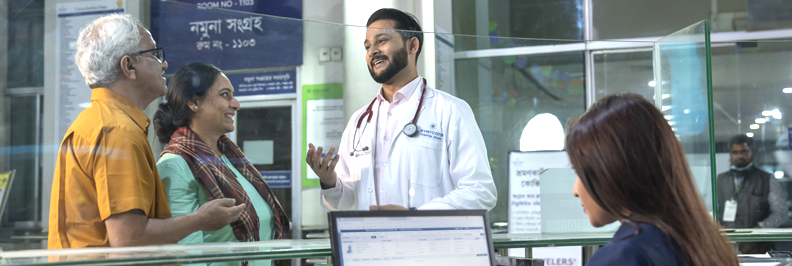ENT & Head Neck Surgery
ENT & Head Neck Surgery Care Centre at Evercare Hospital Dhaka
ENT & Head Neck Surgery Department of Evercare Hospital Dhaka offers comprehensive treatment for a wide range of patients who need surgical or conservative treatments for the nasal passages, sinuses, ears, mouth, pharynx, throat, and head-neck regions. The department houses state-of-the-art technology and is backed by experienced ENT & Head Neck Surgery Consultants, doctors, nurses and technologists.
All related problems are shown to the patients on TV monitors and are discussed in detail with them before rendering any surgical treatment. This helps patients to understand their problems better and in decision making. The department deals with all ENT related problems and emergency situations to provide full coverage of services.
CONSULTATION & APPOINTMENTS
The Department provides consultation services in level-4 (OPD) through highly qualified and experienced Consultants, who carefully evaluate each patient. After diagnosing patient’s condition, the Consultants discuss available treatment options and recommend the most effective treatment. The ENT OPD is equipped with state-of-the-art video endoscopy for its patients.
List of Doctors
We can help you choose top specialists from our pool of expert doctors, physicians and surgeons.
Conditions Treated
General & laparoscopic surgeries commonly performed by the Department include:
The ENT Department offers range of services for conditions of the ear, nose, throat, speech, and head & neck regions. We are performing laser ENT surgeries for a number of ENT conditions. State-of-the art cochlear implant (first in Bangladesh) for permanently deaf patients and FESS (functional endoscopic sinus surgery) are among many modern surgeries being successfully performed by our ENT surgeons.
Click on the links below for details of our services and surgery options.
- EAR PROBLEMS
- HEARING SCREENING TEST
- NEWBORN HEARING SCREENING
- COCHLEAR IMPLANTS
- SINUS PROBLEMS
- DISEASES OF THE NOSE
- TONSILS & ADENOIDS
- HEAD & NECK CANCERS
- SPEECH PROBLEMS
EAR PROBLEMS
Wax Accumulation
Wax is a normal secretion in the ear and its purpose is to protect the eardrum. At times it may cause blockage, deafness and/or pain in the ear, when it needs to be removed. The use of commercial ear buds to clean the ear, routinely, is not advised. It may damage the ear and its hearing function. The department provides professional clearance of wax accumulation from the ears.
Perforation of Ear Drum
Ear drum protects the ear and conducts sound to the small bones for hearing, and once perforated, the ear drum needs repair. This process is called Myringoplasty If the hearing bones are also damaged and are not conveying the sound waves, they may also need to be repaired for better sound conduction and hearing by a procedure called Tympanoplasty.
Fluid behind Ear Drum
In children, having nasal discharge or blockage of the nose is a common problem. The discharge gets into the tube between the ear and the nose and causes a blockage, which results in fluid collection in the ear. It causes deafness and pain in the ear, for which a simple surgical procedure to put a tube in the ear drum becomes necessary. This procedure is called Myringotomy-Grommet.
Chronic Ear Discharge
Repeated cold and pain in the ear weakens the drum. The ear drum may give away; in such a case, and a discharging hole is created. The patient becomes deaf and has a chronic ear discharge. At other times, the drum may get sucked in; the outer lining which normally sheds off gets collected, absorbs the bony structure and gets infected to cause not only deafness but many complications including life threatening diseases.
This needs immediate attention. For the former problem, the ear needs to be kept clean, dry and later the drum is repaired through Myringoplasty. For the latter, it may necessitate clearing of the disease and the subsequent repair of the ear by means of Mastoidectomy and Tympanoplasty.
Otosclerosis
Otosclerosis is a disease which affects more young females than males, where one of the ear bones gets fixed to cause deafness and produces noises in the ear. The deafness is progressive. It is treated by surgery called Stapedectomy. An alternate to the surgery can be the use of hearing aids.
Deafness
Presently, an implantable bionic ear, Cochlear Implant, is available for children and adults having severe to profound hearing loss. The department has already successfully performed two cochlear implant surgeries. Evercare ENT Department was the first in Bangladesh to have performed this cochlear implant surgery.
A cochlear implant may be an option in the following cases:
- Conductive Hearing Loss: This happens due to malfunctioning of conductive mechanism in the external and middle ear.
- Sensorineural Hearing Loss: Obstruction in the electrical impulses to the brain is its cause.
- Slow Developing Child: In a growing child if there is significant hearing loss, the child is deprived of the sound input which is a must for development of speech, as well as for other aspects of overall development like academic development. Plenty of such cases have been, sadly, labelled as ‘Mentally Retarded’. These children need to be checked and managed by ENT Surgeons.
HEARING SCREENING TEST
Hearing Screening Test consists of tests of function of the hearing mechanism. This includes tests of mechanical sound transmission (middle ear function), neural sound transmission (cochlear function), and speech discrimination ability (central integration). A complete evaluation of a patient’s hearing is done by trained and experienced Audiologist using instruments designed specifically for this purpose.
Hearing Screening Test | Price: BDT 3,600
- Stapedial Reflex Threshold Test (SRT)/ Speech Discrimination Score (SDS)
- Pure Tone Audiometry (PTA)
- Impedance Audiometry
- Consultation
People who need Hearing Screening Test include:
- Frequent mobile phone users
- Call Centre operators
- People working in manufacturing plants with increased sound load
- Growing children with milestone developmental delay (speech delay, autism, attention deficit, hyperactivity, school defaulters, etc.)
- Persons receiving significantly long-term ototoxic drug therapy (like amino glycosides)
- Persons who have suffered from any diseases that may eventually have affected hearing
NEWBORN HEARING SCREENING
Evercare Newborn Hearing Screening aims to detect hearing loss in newborns and other babies early in order to facilitate intervention and treatment as quickly as possible. One to two babies in 1000 have significant hearing impairment at birth and are at risk for speech, language, intellectual, social and emotional development.
Without a screening test, this impairment may not be detected until much later. Early detection, followed by appropriate intervention, will minimize the harmful effects on the child’s development. The screening test should preferably be done within the first six months of the baby’s birth.
Evercare Newborn Screening is performed by trained staff under supervision of a paediatrician, who is backed by ENT surgeons. The test takes only a few minutes and will not hurt the baby in any way. The test uses Otoacoustic Emission (OAE), where a small soft-tipped earpiece is placed in the outer part of the baby’s ear which sends clicking sounds down the ear.
When an ear receives the sound, the inner part (known as the cochlear), usually produces an echo. The screening equipment can pick-up the response.
Newborn Hearing Screening is offered to all babies born at Evercare Hospital Dhaka. It is also available for other babies at Evercare Paediatrics OPD, Saturday – Thursday. To make an appointment for Newborn Hearing Screening, please call our Paediatrics OPD at 02-8431661 Ext: 5153.
COCHLEAR IMPLANTS
A cochlear implant is a device that provides direct electrical stimulation to the auditory (hearing) nerve in the inner ear. Children and adults with a severe to profound hearing loss who cannot be helped with hearing aids may be helped with cochlear implants.
This type of hearing loss is sensorineural, which means there is damage to the tiny hair cells in the part of the inner ear called the cochlea. Because of this damage, sound cannot reach the auditory nerve. With a cochlear implant, the damaged hair cells are bypassed, and the auditory nerve is stimulated directly.
The cochlear implant does not result in “restored” or “cured” hearing. It does, however, allow for the perception of the sensation of sound.
The benefits from a cochlear implant depend on many factors, such as:
- The age of the patient when he or she receives the implant
- Whether the hearing loss was present before or after the patient developed language skills
- The motivation of the patient and his or her family
Cochlear implants have external (outside) parts and internal (surgically implanted) parts that work together to allow the user to perceive sound. ENT Department in Evercare Hospital Dhaka has started Cochlear implant Program.
Team members typically include an audiologist, otologist (ear doctor)/surgeon, psychologist, counselor, and speech-language pathologist. The team works with individuals and their families to determine candidacy for an implant, perform the surgery, and provide follow-up care.
SINUS PROBLEMS
Sinuses are air filled spaces around the nose which inhale and exhale the air during breathing. These spaces are aerated through small opening in that cavity. If the openings of these sinuses get blocked, due to common cold, the sinus develops inflammation called Sinusitis, commonly referred to as Sinus. A patient may complain of blocked nose, pus discharge, headache, sneezing and fever.
He needs to be treated with medicines, steam, decongestants and antibiotics. Surgery of sinus ensures normal functioning of the sinus by removal of the obstruction and opening or enlarging of the sinus so that infection does not stay put. The surgery, done with the help of endoscopes, is called FESS (functional endoscopic sinus surgery). To know the precise extent of the disease, a CT scan of the sinus is a must.
DISEASES OF THE NOSE
The common ailments affecting the nose are nasal blockage, discharge, excessive, sneezing and bleeding or nasal deformity. The doctor enquires about the detailed history to know more about the problem and to decide the line of management.
Allergic Rhinitis: The nasal lining is swollen, and the patient has blockage, sneezing and a watery discharge from either side. Some tablets, nasal drops, exercises coupled with avoidance of the allergen improve the condition.
Deviated Nasal Septum: If the nasal septum is deviated and causes nasal blockage and is not improving with medicines, it needs to be straightened by surgery called Septoplasty.
Nosebleed: It is a symptom of an underlying disease which may be an ulcer on the septum, injury to the nose, high blood pressure and needs to be treated accordingly.
Nasal Polyp: If the allergen has been there for long time, the patient’s mucosal lining of the sinus may get filled with fluids and present themselves as nasal polyp (a grape like structure), which certainly needs to be removed by surgery. Facilities for FESS are available in the department.
Deformed Nose: Patients with obstructed deformed (long, depressed, deviated, crooked nose) nose are corrected by procedure called Septorhinoplasty.
TONSILS & ADENOIDS
The Department of ENT provides surgeries for the removal of tonsil and adenoids.
Tonsils are a part of the body’s protective system which lie in the oral cavity and are visible when one opens the mouth. Their free surface has holes called crypts. Acute infection of the tonsil is one of the most common infections in the body, more common during childhood, causing pain in throat and fever, lasting for few days. If this occurs recurrently for more than 4 times in one year, they need to be removed.
In children a similar tissue which lies behind the nose is called adenoids and if it gets infected, it may cause nasal blockage, ear blockage, breathing from mouth and snoring. These should be removed, too, along with the tonsils.
HEAD & NECK CANCERS
A very large percentage of cancers affect the head and neck regions. In our country, cancer of the throat and oral cavity are rampant, which may be due to habits of chewing ‘paan’, tobacco, cigarette smoking, poor oro-dental hygiene, etc.
Fortunately, the condition produces early symptoms like ulcer in the oral cavity, swelling in the neck, change of voice, difficulty in swallowing, and so it can be detected earlier. A good examination of the area, tissue taken for examination, or fine needle aspiration cytology can diagnose the condition and an early treatment can provide relief.
SPEECH PROBLEMS
Hoarseness or change in character of voice is usually due to either, a nodule or polyp on the vocal cord, or due to paralysis of the vocal cord. The primary problem is identified by the use of Fibreoptic Laryngoscopy (FOL), and treatment plan is made accordingly. We have the facility of doing Microlaryngeal surgery at our department.
This is a very accurate removal of the pathology under microscopic control, so as to preserve the normal structure of the vocal cord, CO2 laser can be used for the same for vocal cord palsy, we have the facility of Vocal Cord Medialization Surgery, a specialized procedure to correct the vocal cord position due to paralysis of the vocal cord. For non surgical pathologies, we have the facilities of a trained voice and speech therapist
IMPORTANT POINTS ABOUT TESTS/PROCEDURES/SURGERIES, YOUR REPORTS & BILLING ENQUIRIES
- Tests/Investigations:
- To schedule a test/investigation, please call the relevant OPD front desks.
- Your lab investigation samples are to be deposited in the Sample Collection Room located in the hospital’s atrium, which is open on working days (Saturday-Thursday) from 7.00 am to 10:00 pm, and on Fridays and holidays from 7.00 am to 6.00 pm.
- Your investigation reports can be collected from Report Delivery Room by showing the receipt of payment. The hospital shall not be responsible for reports not collected within 30 days after the tests were done. Report Delivery Room is also located in the hospital’s atrium, and is open on working days (Saturday-Thursday) from 8.00 am to 8.30 pm, and on Fridays and holidays from 9.00 am to 5.00 pm.
- You will not be able to collect your investigation reports without your receipt of payment. If you have lost your receipt, you may collect a duplicate copy from our Billing Executives (Corporate Desk, Atrium – level 1).
- You can request duplicate copy of your investigation reports from the Report Delivery Room, inclusive of BDT 100 additional charge.
- Procedures & Surgeries:
- If you are interested in undergoing a procedure or surgery, please see our relevant Consultant first.
- To search for a Consultant, go to Find a Consultant page and for appointments, go to Make an Appointment
- In-patient Reports
- A Discharge Summary is provided to a patient upon his/her discharge from the hospital. A discharge summary is a summary of the events during hospitalization of the patient. It outlines the patient’s chief complaint, the diagnostic findings, the therapy administered and the patient’s response to it, and recommendations on discharge.
- To request for detailed in-patient medical reports or to make an insurance claim, refer to our Medical Report
- For queries on charges, contact our Billing Department (Corporate Desk, Atrium – level 1) or call/e-mail our Billing Executives:
| Mr. Taslimur Rahman: AGM – Financial Operation Phone : +88-02-8431661-5; Ext-1353 (From 9 am to 5 pm –Except Holidays) E-mail: taslimur.rahman@evercarebd.com |




